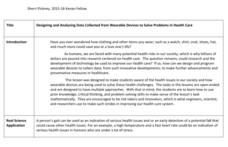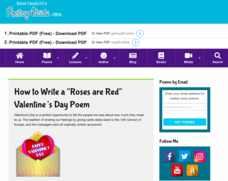EngageNY
Differences Due to Random Assignment Alone
It takes a lot of planning to achieve a random result! Learners compare results of random assignment, and conclude that random assignment allows results to be attributed to chance. They also realize the set of random means are clustered...
Facing History and Ourselves
Decision-Making: Introduction to the Unit
Make your classroom a supportive and communicative place to be before beginning a unit on the Holocaust. Working together as a class, learners reflect on their previous experiences of classroom discussions before establishing a...
DiscoverE
A Clever Way to Water
Your plants will survive without you. Scholars create a device that can water plants using a coiled string. Along the way, they learn about adhesion and cohesion of water. The challenge is to keep the plants alive for at least a week.
ReadWriteThink
A Picture's Worth a Thousand Words: From Image to Detailed Narrative
A picture's worth a thousand words—and even more inspiration! A visual activity uses photographs to inspire writers. The process teaches aspects of narrative writing, such as point of view and characterization.
Houghton Mifflin Harcourt
Person to Person: Challenge Activities (Theme 4)
The world is a big place—discover it! A series of challenge activities designed to accompany Theme 4: Person to Person encourages learners to explore the world around them. Project-based activities promote research and writing skills in...
Kenan Fellows
Dinner Party: Using Pattern Trains to Demonstrate Linear Functions
Nothing fancy here ... just your run-of-the-mill Algebra party! Learners explore the patterns of linear functions while designing seating arrangements for a dinner party. Comparing the number of tables to the perimeter of the combined...
Kenan Fellows
Designing and Analyzing Data Collected from Wearable Devices to Solve Problems in Health Care
Wearable devices have become more the norm than the exception. Learners analyze data from a sample device with a regression analysis in a helpful hands-on instructional activity. Their focus is to determine if there is a connection...
Curated OER
Extending Vocabulary to Describe Communities
Second graders study vocabulary to describe their community. In this meaning of words lesson, 2nd graders acquire new vocabulary words to label pictures and objects. They use these words in speaking and writing.
Smithsonian Institution
A Ticket to Philly—In 1769: Thinking about Cities, Then and Now
While cities had only a small fraction of the population in colonial America, they played a significant role in pre-revolutionary years, and this was certainly true for the largest city in the North American colonies: Philadelphia. Your...
Film Foundation
Mr. Smith Goes to Washington: What Is a Movie?
Watching is not the same as seeing. Transform viewers from passive watchers to active students of film with this 34-page packet, filled with lessons and activities that use Mr. Smith Goes to Washington to examine the technology, the...
Teach Engineering
Introduction to Environmental Engineering
A series on environmental engineering introduces the class to issues that environmental engineers work to solve. This first lesson focuses on air and land issues, and looks at ways to reduce pollution.
Curated OER
Drawing to Scale
Students examine the process of drawing a picture to scale. They analyze and discuss real-life blueprints for a house, and create a scale drawing of an original invention using calculators and rulers.
Curated OER
Describe a Shop or Restaurant
In this describing a shop or restaurant worksheet, learners complete a graphic organizer to describe the style, cost, location, good points, bad points, and other information and write descriptive sentences about the shop or restaurant....
Super Teacher Worksheets
Literature Circle Packet
Looking to set up literature circles in your class? Use these materials to support pupils when they meet in groups. Pupils take on various roles over the course of reading and meet with their groups to share the work they have done on...
Curated OER
Western Civilizations, Chapter 5: Roman Civilization
Investigate Ancient Rome with this comprehensive online western civilizations website. While designed for use alongside the Western Civilizations textbook, the tools on this site can be used to emphasize any study. A chapter quiz...
K12 Reader
Change the Adjectives to Nouns
Adjectives are supposed to describe nouns, but they can actually become nouns themselves! Learners review ten adjectives and transform them into the nouns found in their roots.
National Association of Biology Teachers
Using the Discovery of the Structure of DNA to Illustrate Cultural Aspects of Science
Times have changed—and so have science practices. An introductory instructional activity describing the components of DNA begins with a discussion of the discovery of DNA and its perception in different cultures and genders. Scholars...
Facing History and Ourselves
Responding to Difference
James Berry's poem, "What Do We Do With a Difference?" launches a lesson that asks class members to consider the ways people respond when they encounter someone different from themselves. After analyzing the poem and discussing how they...
EngageNY
Reading Closely to Build Background Knowledge: “Myths and Legends”
That is a myth! Scholars take a look at Greek myths referenced in The Lightning Thief. As learners listen to stories in Myths and Legends, they imagine the sights and sounds described. Pupils then talk with partners about specific words...
American Chemical Society
Atoms Can Be Rearranged to Make Different Molecules
Uncover the building blocks of the universe as budding chemists explore atoms and molecules in an exciting inquiry-based activity. Investigators view an interactive video describing the chemical structure of six molecules. Using...
Curated OER
From Sheep to Rug
Ever wonder where wool comes from? How it is used to make a woven rug? Introduce the Native American craft of rug making to your preschool or kindergarten class with a discussion. Learners examine and discuss images of a Native American...
Houghton Mifflin Harcourt
Family and Friends: Extra Support Lessons (Theme 4)
Family and Friends is the theme of a unit offering extra support lessons. Follow each lesson plan's teach, blend, guided practice or practice/apply routine to reinforce concepts such as clusters, responding to reading, drawing...
Poetry4kids
How to Write a “Roses are Red” Valentine’s Day Poem
Compose a Valentine's Day poem! Practicing their rhyming skills, scholars follow the traditional format to create a happy poem for a friend or family member.
Poetry4kids
How to Write a Concrete or “Shape” Poem
Writers compose an original shape poem. Scholars choose a subject to write about and create a visual representation by forming a corresponding picture using the poem's words.
Other popular searches
- Words to Describe People
- Precise Adjectives to Describe
- Writing to Describe
- Words to Describe Location
- Describe How to Get to Safety
- Words to Describe the Past

























